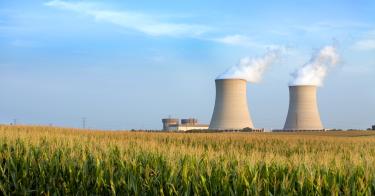Go back to Sept. 26, 1963. Standing before a crowd of 37,000, President John F. Kennedy exhorted his audience to expand their definition of "conservation." The setting was unusual—behind him stood the newly constructed N Reactor in Hanford, Wash. Nuclear energy, he said, fit squarely into the definition of conservation.
Such a suggestion would be anathema to some today, confusing to others. Thanks to the political correctness and careful marketing of the last decade or so, "clean" has most often meant technologies such as wind and solar.
Such a conviction persists in state renewable energy mandates, tax subsidies and political fantasies such as the Green New Deal. The World Bank and other international financing organizations have loud and proud "clean energy" portfolios that explicitly exclude nuclear energy. And the EU is currently debating whether nuclear energy should be included in the definition of green for finance law.
But people today, as in JFK's time, should reconsider definitions. Conservation isn't just what we traditionally have understood as protecting and using resources well, in the sense of not wasting resources such as water and land.
President Kennedy argued it was more—to use science and technology to unlock access to new kinds of energy and new ways to develop and use it. Through innovation, we can get more with less. Nuclear energy was a case in point, he said, and he anticipated the new millennium—when, he believed, Americans would get half of their electricity from nuclear.
To an extent, he was right. Nuclear energy is reliable, has an outstanding safety record, produces no air pollution, is greenhouse-gas-free and requires little acreage for the thousands of megawatts a reactor generates. It's also efficient.
>>>The Right Way to Ensure a Cleaner Environment
Since 2013, only one new nuclear reactor has come online in the U.S. while nine others have closed. And yet efficiency improvements have had the effect of increasing electricity production, making 2018 a record-breaking year for the nuclear industry. Waste, too, is a solvable issue - while political dysfunction has overcome progress in America, the nuclear industry in Finland is accomplishing the task.
In short, nuclear power has unlocked opportunities unfathomable 60 years ago in power generation and in industries as diverse as medicine, defense, space exploration and food safety.
In other ways no one could have foreseen, though, JFK was mistaken. Rather than half, Americans today get only 19% of their electricity from nuclear power.
Many things occurred in between that challenged nuclear energy's role. Among them is a narrow notion of "clean" energy baked into big-government programs.
Very often, presidential candidates, government officials at all levels and sometimes voters have equated clean energy with renewable energy, rather than considering the actual environmental results of energy choices. Deployed in regulatory schemes, mandates and big-government handouts, such narrow definitions have actually shut out nuclear power from providing affordable, reliable electricity. As usually happens in the energy sector, politics muddles things.
Take California, one of the states providing supposed leadership on clean energy. It has aggressive mandates to reduce carbon dioxide emissions 80% by 2050, and acquire 60% of its electricity from renewable energy sources by 2030. Yet despite producing no greenhouse-gas emissions, nuclear power doesn't count toward the mandate. The state's only nuclear power plant will shut down early because it must run uneconomically to make room for mandated solar and wind.
On the opposite coast, add to that list Vermont Yankee, which closed in 2014, and Indian Point, which services New York City and will close in 2020-2021. Neither closed for safety reasons, but fell to political pressure levied by extreme environmentalists who bullied governors long enough.
In other words, California, Vermont, New York and others have confused the means for the end they seek. They have equated "clean" with "wind and solar technology." And they have, intentionally or not, used the force of government to push out nuclear power despite its capability to provide vast amounts of clean energy.
Nuclear energy still has that potential to improve our environment and make the world better with clean energy. All the more reason to adopt President Kennedy's definition of conservation.
This piece originally appeared in Tribune News Service



